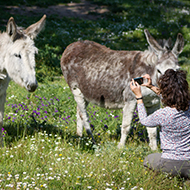Study finds whistles heard decades ago remain familiar
It has been revealed that dolphins, like humans, have multi-decade-long memory spans.
Research carried out by Jason Bruck, from the University of Chicago, revealed that dolphins were able to recognise their old tank mates' whistles after being separated for more than 20 years.
As the only non-human species known to have a long-term social memory of this kind, it is thought that dolphins may in fact be able to remember a signature whistle for even longer than the study recorded.
Dr Bruck collected data from 53 different bottlenose dolphins across six sites in order to conduct his research.
Each site belongs to a breeding consortium and had therefore rotated its dolphins, keeping records of which ones had previously lived together.
Since recent studies have revealed that dolphins develop their own unique signature whistle, which is effectively used as a name, Dr Bruck played whistle recordings of dolphins they had previously lived with, as well as that of those they had never met.
He found that they got bored quickly by unfamiliar whistles, but would "perk up" and elicit an immediate response to a call they recognised.
"When they hear a dolphin they know, they often quickly approach the speaker playing the recording," he explained. "At times they hover around, whistle at it, try to get it to whistle back."
Dr Bruck, who received his Ph.D in June, added that the study shows an animal operating cognitively at a level that is "very" consistent with human social memory.
"This is the kind of study you can only do with captive groups where you know how long the animals have been apart. To do a similar study in the wild would be almost impossible," he concluded.
The research has been published in the Proceedings of the Royal Society of London B journal.
Images courtesy of Jim Schulz/Chicago Zoological Society






 RCVS Knowledge has called on vet practices to audit their post-operative neutering outcomes.
RCVS Knowledge has called on vet practices to audit their post-operative neutering outcomes.
